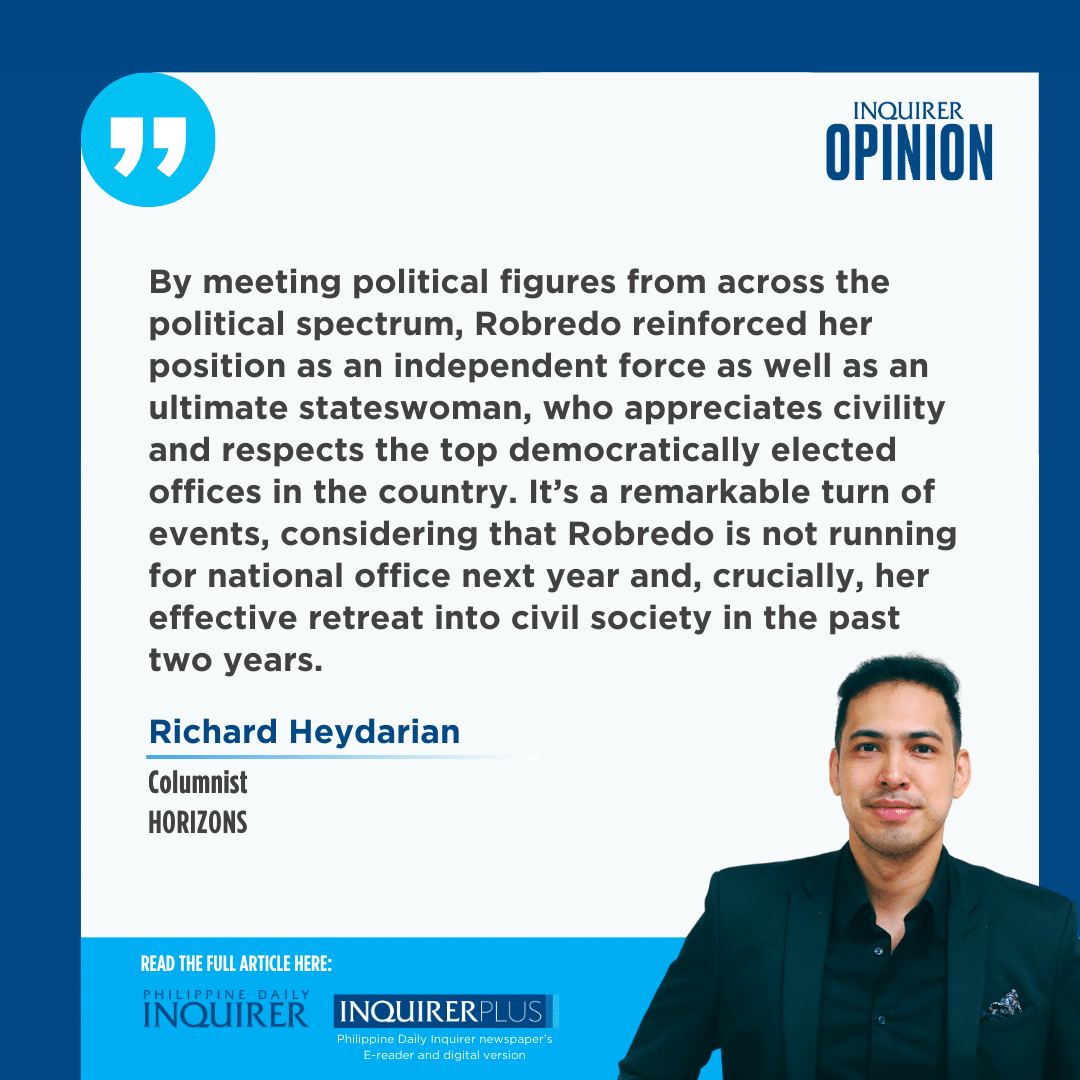‘Pink power’: Leni rises again
It felt both surreal and exhilarating. At once, I was both at my sharpest as well as dazed. I don’t know if it was the lack of sleep after weeks of commuting between my hometown and Manila—as I watched my beloved grandmother fade away after weeks of valiantly fighting for life in an intensive care unit. While struggling with grief and coming to terms with the unexpected loss of an inimitable source of inspiration, I had to recollect myself for several engagements in recent days. And none were as emotionally poignant as rejoining former senator Leila de Lima in person for a panel discussion—jointly hosted by Konrad Adenauer Foundation and Friedrich Ebert Foundation—on the nexus between democracy and disinformation.
Here we were both of us smiling and passionately arguing in defense of our freedoms before a European delegation of bureaucrats, technocrats, and constitutional experts. It felt unreal. Here we were sharing lessons about preserving democracy against all odds. Here we were pontificating about holding the fort against the onslaught of disinformation and malign influence operations by superpowers.
Article continues after this advertisementThe last time I saw her in person was more than half a decade ago. Back then, neither her future nor our country’s seemed particularly reassuring. While the former senator had to come to terms with the prospect of spending the rest of her life in detention on trumped-up charges, the last vestiges of Philippine democracy, in turn, were about to succumb to a full-blown dictatorship under the Duterte dynasty.
Those were extremely dark days—unquestionably grim for anyone who dared to speak truth to power, including lowly academics like yours truly. The torrent of trolls and death threats haunted even the grittiest souls at night. Legal harassment and public criticism from top organs of the state, who didn’t take kindly to some of my writings for global publications on the state of the Philippine economy and democracy, were even more alarming. Not to mention, my daring decision to write a book on Rodrigo Duterte’s rise to power, which effectively exposed, albeit in academic lexicon, the proto-fascist underpinnings of the new regime (the monograph opens with Antonio Gramsci’s reflections on Italy’s descent into Mussolini’s reign of terror).
Risking your career—eventually losing a prized position in a top media network—after years of painstakingly building up your profile was wrenching. The shivers down your spine every time a motorbike and a dark helmet appeared over the horizon. Desperately drawing on my years in martial arts, I even devised some ridiculous maneuvers if ever worst fears ever came to fruition.
Article continues after this advertisementThe sleepless nights and dizzying days wondering if permanent exile was the best option forward. Wondering about your safety whenever you return to the country after an extended overseas engagement. The list of terror and trauma is long—accentuated by the dearth of vocal support from countless colleagues and those supposedly from the progressive opposition.
And this is precisely why my reunion with De Lima was singularly heartening. It came against the backdrop of a steady revival of the progressive opposition ahead of next year’s elections. While the former senator is bravely throwing her hat back into the ring, former vice president Leni Robredo has rapidly re-emerged as the “kingmaker” in the Philippine political landscape.
Over the past month, practically all major political figures in the country—including the President, the Vice President, and leading senatorial candidates—have paid courtesy visits to Robredo. Except for Sara Duterte, all the other major figures have proudly posted cordial pictures with the former vice president, who remains extremely popular and serves as a symbol of good governance for millions of Filipinos.
By meeting political figures from across the political spectrum, Robredo reinforced her position as an independent force as well as an ultimate stateswoman, who appreciates civility and respects the top democratically elected offices in the country. It’s a remarkable turn of events, considering that Robredo is not running for national office next year and, crucially, her effective retreat into civil society in the past two years.
The ugly divorce between the House of Duterte and the House of Marcos has provided a historic opening for the genuine opposition to win back the hearts and minds of the Filipino electorate. And pink—the color of democratic hope and good governance—is back in vogue. Against all odds, the future of Philippine democracy looks a tad more hopeful these days.
rheydarian@inquirer.com.ph

















